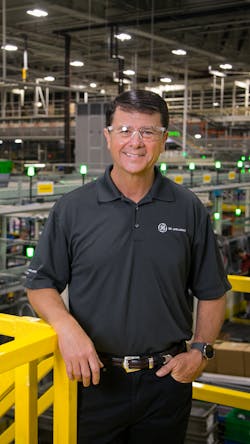Talent Advisory Board: How to Know When You're Ready for the Next Career Challenge
The IndustryWeek Talent Advisory Board offers monthly advice on how its members got to where they are in the manufacturing world. They offered so much great advice for May that we're breaking it into two parts, with half of the responses running today (Tuesday May 30, 2023) and half (Part 2) running tomorrow (Wednesday, May 31, 2023). If you have a question for the group, please send it to [email protected]. This month's question was:
When do you know when you’re ready for your next career challenge?
Finding Fulfillment: How Career Changes Can Support Family Priorities
Tim Noble, President and Recruiter for Lean-Six Sigma-Industry 4.0-Operations, The Avery Point Group Inc.
During the early part of my career, I experienced all of these motivations when it came to making a job change. But, as I got further into my career, I reflected on my situation and realized that my career needed to align better with my long-term goals and personal objectives, which, for me, started to be more focused on starting a family.
At that point in my life, my wife and I were approaching our late 30s and had been married for almost 14 years. We were eager to begin a family, but with both of us working in global executive roles and traveling more than 70% of the time internationally, our paths rarely crossed. Our frequent travels were evident from the numerous pages added to our passports. Recognizing that we needed to prioritize our family goals, we knew our careers had to undergo a significant change. We needed to find roles that better balanced our career objectives and family priorities.
As a result, I made the decision to leave my global operations executive role and started my own executive search firm, while my wife transitioned from her high-travel role to one that allowed her to work remotely with one of her previous employers. One year later, our daughter, Ashlin, was born. Our career changes enabled us to be present in her life each and every day. I had the opportunity to drop her off at school each morning, and my wife was home to greet her after school and assist with her homework. Neither one of us would have been able to do that in our prior roles.
Ashlin just finished her junior year of high school and is interested in a career in engineering. Both my wife and I never felt that we had sacrificed anything from a career perspective, but we gained everything from a family perspective as a result of our career and role changes.
This experience taught us the importance of aligning our careers with our personal and family goals as a part of any job or career change considerations. It highlighted the significance of self-reflection and making choices that prioritize what truly matters to us in the long run. By understanding our motivations and taking the necessary steps, we were able to create a balance between our careers and our family life.
Boredom Signals Need to Change
Becky Morgan, President, Fulcrum ConsultingWorks Inc.
One boss created a lateral move for himself so I could step into his position before I realized I was getting bored. He could see it and knew I would leave if not presented with more of a challenge. I changed industries multiple times and believed I could succeed in any role that I found interesting. I found more commonalities across industries than most expect. That ability to observe common attributes and to distinguish critical distinctions gave me a shortened learning curve everywhere I went.
After 14 years in industry, I started my consulting business. That was a means to constantly work with different industries, companies and leadership teams in arenas I found enjoyable. I continually fine-tuned my market and the challenges of the businesses that wanted my help.
The concept of “readiness” for my next challenge was always based more on what I found interesting than on what my defined skills could handle.
If you find your work invigorating, you will keep learning by taking on new challenges, perhaps in new organizations or roles or industries. If you find it feels like a job, it’s past time for you to move on to your next career challenge.
Experiencing the Impact of Decisions
Carlos H. Torres, Head of Industry 4.0 at USA 5G Smart Factory, Ericsson
First, I believe that once a job becomes routine and no longer offers challenges, that’s when you know it’s time for your next career move. I thrive in chaos. It’s exciting to me. The challenge is taking chaos and transforming it into something that can consistently deliver quality results with a motivated and empowered group of smart people.
Second, I think it’s important to experience the impact of decisions. Decisions that at times may take months or even years to come full circle. This is where true learning happens. Anybody can make decisions, and we have many tools to aid in decision-making – but how many people actually take the time to let those decisions play out and think about them retrospectively? When we take time to experience the impact of our decisions, we can better understand how to move forward in our careers.
Trust the People Who Believe in You
Bill Scilingo, Vice President of Operations, Penn Color Inc.
Flashback to early in my career; a degreed chemical engineer charged with controlling the application of catalytic solutions via a distributed process control system—an assignment that was challenging but comfortably fitting in the wheelhouse of a ChemE.
Everything seemed clear until my superior asked me to lead the maintenance operations for the campus. Initially I thought, “Why would a chemical engineer want to dive into a world of mechanical and electrical systems which I had not been exposed nor trained to manage?”
At the insistence of my boss that this would be a tremendous learning and growth opportunity, I accepted the responsibility. On day one I was greeted by tenured maintenance team members who handed me a hard hat with the number 30 on it. Enquiring about the significance to the number 30, the crew explained that I was the 30th maintenance manager in the history of the site and graciously pointed to a hard hat with the number 31 sitting on the shelf in preparation for the next incumbent.
I knew I had to prove myself and applied a simple approach. I clearly was not the expert and understood the need to be involved in the details to learn the systems—while empowering, engaging and trusting the team members to assist with problem solving and departmental decisions. I learned more over those three years leading this team than probably any other time in my career. The experience made me confident that I could learn anything I applied myself to and that through empowerment, engagement and trust I could lead any group.
Post- this assignment, I knew I was ready for any challenge in my career. Sometimes you may not feel you are ready for an opportunity, but keep an open mind, as this career challenge may be just the experience to drive your future.
Always Embrace Growth and Learning
Bill Good, Vice President Supply Chain, GE Appliances
Early on, I recognized that opportunities come to those who differentiated themselves within their professional level or band. Attributes like business knowledge, clear thinking, managerial courage/confidence, organizational navigation, leadership, tenacity and others are traits highly sought after by those making hiring and promotional decisions. I not only worked on my personal growth and development in these categories, but I would also gauge myself against the best of my peer group and my current manager. I would ask myself, “What does the organization see in these leaders that makes them special and capable?” This informal career gap analysis generated a roadmap of the next skill and competency I needed to gain.
Objectivity is key in this process. You must have a realistic view of your skillset and performance. I always capitalized on my career counseling sessions with my manager and walked away with a clear understanding of where I needed to improve.
Over time, I came to realize not all moves will be promotions. I often took lateral moves in an effort to further expand the depth and breadth of my manufacturing IQ. When asked to take on a different assignment, I would always thoroughly evaluate what I could learn from the opportunity. If it could further my growth, then it was something to consider.
Having a growth mindset on personal development makes you a better candidate for the next career move.
About the Author
IW Talent Advisory Board
An expert panel of manufacturing leaders offering advice on how to advance your career.
Beginning a career in any industry is challenging, and many people early in their journeys in manufacturing need advice on how to advance and reach the next milestone. IndustryWeek’s Talent Advisory Board collects manufacturing leaders who rose through the ranks and are happy to share stories and advice on how they got to where they are now. This group includes senior-level people and young leaders who advanced quickly in their organizations. They work for large companies or run their own businesses, representing a wide swathe of careers within manufacturing.
Every month, we ask the group a new question about their careers or life experiences. If you have a question for the group, please send it to IndustryWeek [email protected].





